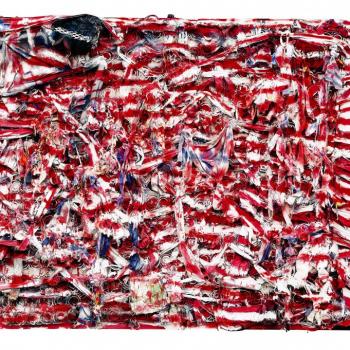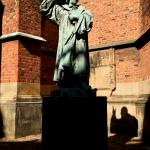Apropos of last Sunday’s post on Tocqueville and next week’s visit by the Pope to America, here is a short essay describing some possibly Tocquevillian themes in Benedict’s first encyclical, Deus Caritas Est:
Upon being inducted into the Académie des Sciences Morales et Politiques of the Institut de France in 1992, then-Cardinal Ratzinger remarked that Tocqueville’s “Democracy in America has always made a strong impression on me.“
Describing Tocqueville as “le grand penseur politique,” the context of these remarks was Ratzinger’s insistence that free societies cannot sustain themselves, as Tocqueville observed, without widespread adherence to ”des convictions éthiques communes.“ Ratzinger then underlined Tocqueville’s appreciation of Protestant Christianity’s role in providing these underpinnings in the United States. In more recent years, Ratzinger expressed admiration for the manner in which church-state relations were arranged in America, using words suggesting he had absorbed Tocqueville’s insights into this matter.
What has this to do with Deus Caritas Est? The answer is that Benedict XVI has taken to heart Tocqueville’s warnings about “soft-despotism.” In Deus Caritas Est, he writes:
“The State which would provide everything, absorbing everything into itself, would ultimately become a mere bureaucracy incapable of guaranteeing the very thing which the suffering person — every person — needs: namely, loving personal concern. We do not need a State which regulates and controls everything, but a State which, in accordance with the principle of subsidiarity, generously acknowledges and supports initiatives arising from the different social forces and combines spontaneity with closeness to those in need (DCE no.28).”
As someone who experienced Nazism, Benedict XVI needs no lessons about totalitarianism. As a confirmed Augustinian, he is rightly sceptical of any proposal for heaven-on-earth. The words above, however, indicate Benedict’s awareness of Tocqueville’s insistence that even free societies can find themselves almost imperceptibly allowing the state to subsume those autonomous associations that, according to Tocqueville, gave America its dynamic character and limited government power.
There seems little doubt that Pope Benedict is concerned about the state’s potential to sap Christian charities’ autonomy — not through abruptly absorbing their work but by slowly diluting their distinct identity. In principle, Deus Caritas Est does not object to Christian charities cooperating with the state (DCE no.30, 31). Nevertheless the encyclical firmly reminds Christians that “the specific expressions of ecclesial charity can never be confused with the activity of the State” (DCE no.29) and indicates concern about“the activism and the growing secularism of many Christians engaged in charitable work” (DCE no.36).
The contemporary identity-crisis of many Christian charities is not mono-causal. Its sources include many Christians’ effective lapse into practical atheism, their adoption of moral reasoning more akin to John Stuart Mill than Jesus Christ, and some Christian charities’ direct involvement in political activism, the latter explicitly disapproved by Deus Caritas Est.
Yet the Tocquevillian theme subtly woven into Deus Caritas Est surely provides Christian charities with an opportunity to reflect upon the wisdom of associating too closely with the state. This might involve asking questions about the effects of church taxes levied in countries such as Germany or the prudence of accepting government contracts when such agreements require adherence to regulations stating who religious charities may employ and what they may say. If they conclude that such an association undermines their ability, as Benedict XVI states, to be “credible witnesses to Christ” (DCE no.31), then tactful disassociations might be in order.
(HT: Benedict in America)
















